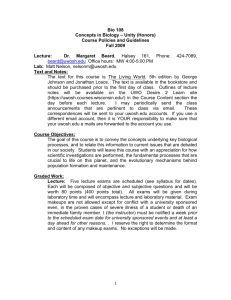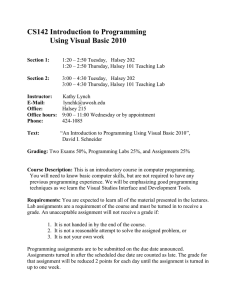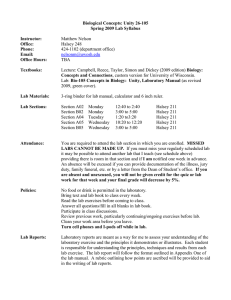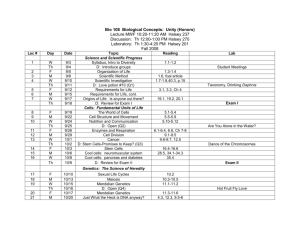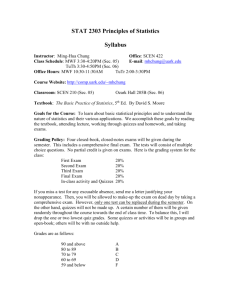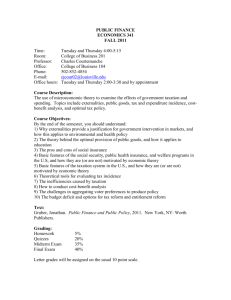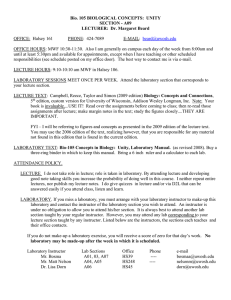Bio 108 - University of Wisconsin Oshkosh
advertisement
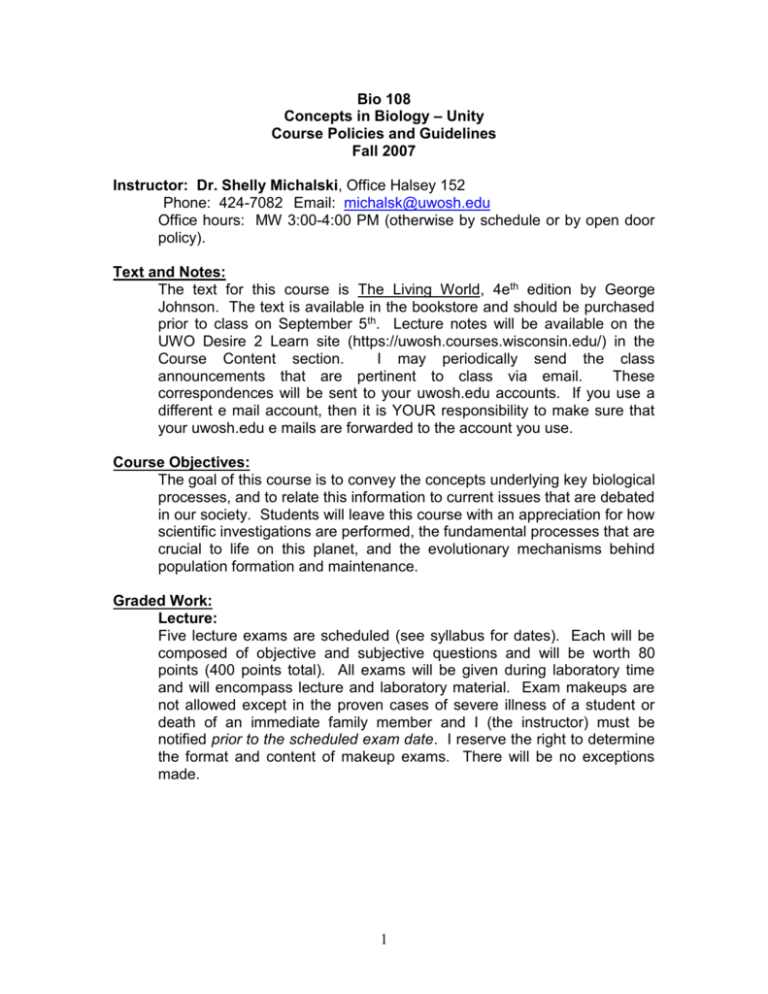
Bio 108 Concepts in Biology – Unity Course Policies and Guidelines Fall 2007 Instructor: Dr. Shelly Michalski, Office Halsey 152 Phone: 424-7082 Email: michalsk@uwosh.edu Office hours: MW 3:00-4:00 PM (otherwise by schedule or by open door policy). Text and Notes: The text for this course is The Living World, 4eth edition by George Johnson. The text is available in the bookstore and should be purchased prior to class on September 5th. Lecture notes will be available on the UWO Desire 2 Learn site (https://uwosh.courses.wisconsin.edu/) in the Course Content section. I may periodically send the class announcements that are pertinent to class via email. These correspondences will be sent to your uwosh.edu accounts. If you use a different e mail account, then it is YOUR responsibility to make sure that your uwosh.edu e mails are forwarded to the account you use. Course Objectives: The goal of this course is to convey the concepts underlying key biological processes, and to relate this information to current issues that are debated in our society. Students will leave this course with an appreciation for how scientific investigations are performed, the fundamental processes that are crucial to life on this planet, and the evolutionary mechanisms behind population formation and maintenance. Graded Work: Lecture: Five lecture exams are scheduled (see syllabus for dates). Each will be composed of objective and subjective questions and will be worth 80 points (400 points total). All exams will be given during laboratory time and will encompass lecture and laboratory material. Exam makeups are not allowed except in the proven cases of severe illness of a student or death of an immediate family member and I (the instructor) must be notified prior to the scheduled exam date. I reserve the right to determine the format and content of makeup exams. There will be no exceptions made. 1 Laboratory: Each laboratory is accompanied by a 25 point laboratory write-up, which is typically at the conclusion of each laboratory period. Students will work in groups in the lab, and may work in groups to complete the laboratory write-up, however write-ups must be in the individual student’s own words (no plagiarism). Quizzes: A 10 point quiz will be given in each discussion session (total 80 points) excluding those that are used for exam review. The quiz will cover laboratory and lecture material. Journals: Students will maintain a journal for biology articles from the popular press. The articles and written summaries will be used on a semi-weekly basis for class discussion during discussion sessions (excluding those used for exam review). Guidelines for composing written summaries will be provided. Articles are due at the beginning of the discussion session. Each article is worth 10 points (total of 80). An article missing a summary or accompanying an incomplete summary is worth zero points. Point Distribution: Exams Quizzes Journal Lab Write-ups 5 8 8 8 x x x x 80 10 10 25 = 400 points = 80 points = 80 points = 200 points 760 points Extra Credit: Extra credit opportunities will be available several times during the semester, either as additional assignments or possibly as additional exam or lab exercise questions. Grading Scale: Students can use the online gradebook of the D2L site to monitor their progress. Percentage Grade 92-100 A 87-91 AB 82-86 B 77-81 BC 72-76 C 67-71 CD 60-66 D <60 F Late Policy: Ten percent off for each week day late. 2 Attendance Policy: Attendance is mandatory for each lecture, discussion and lab session (see “Course Attendance” statement in the Undergraduate Bulletin). There will be no makeup labs, so attendance is crucial. We will occasionally start lab experiments during lecture or discussion time, and finish up lecture topics in lab or discussion time, so please be on time to each session. Outside Readings: Outside reading assignments may be assigned to supplement text/lab material. Copies of the readings will be placed on reserve or handed out in class. You will be responsible for any assigned outside reading material on exams and/or quizzes. Academic Integrity: Students are expected to uphold the guidelines of academic integrity put forth by University of Wisconsin-Oshkosh. Violation of these standards (i.e. cheating) will result in formal written reprimand, a failing grade for the course, and possible disciplinary probation. Common Courtesy: A ringing cellular phone disrupts the learning process of your neighbors. Please turn off all cell phones and pagers prior to class. Americans with Disabilities Act: UWO is committed to providing accommodations and/or services to students with documented disabilities. Students who are seeking support for a disability should contact Disability Services, 125 Dempsey Hall. Phone: 424-3100; TTY 424-1319; email www.tts.uwosh.edu/dean/ 3 Bio 108 Biological Concepts: Unity (Honors) Lecture MWF 10:20-11:20 AM Halsey 367 Discussion: Th 12:00-1:00 PM Halsey 367 Laboratory: Th 1:30-4:20 PM Halsey 201 Fall 2007 Lec # Day Date 1 2 3 W Th F M 9/5 9/6 9/7 9/10 Topic Science and Scientific Progress Syllabus, Intro to Diversity D: Introduce groups Organization of Life Scientific Method 4 W 9/12 Scientific Investigation 5 6 Th F M 9/13 9/14 9/17 7 W 9/19 Th 9/20 F M W Th 9/21 9/24 9/25 9/26 D: Love potion #10 (Q1) Requirements for Life Requirements for LIfe, cont. Origins of Life: Is anyone out there? D: Review for Exam I Cells: Fundamental Units of Life The World of Cells Cell Structure and Movement Nutrition and Communication D: Open (Q2) 8 9 10 11 F 9/28 12 13 M W 10/1 10/3 Th 10/4 14 F 10/5 15 M 10/8 16 W 10/10 Th 10/11 20 F M W Th F 10/12 10/15 10/17 10/18 10/19 21 M 10/22 22 W Th 10/24 10/25 17 18 19 23 F 10/26 24 25 M W 10/29 10/31 Reading Lab 1.1-1.2 Student Meetings 1.3-1.4 1.6, foal article 1.7-1.8,40.3, p.15 Taxonomy, Drinking Daphnia 3.1, 3.3, Ch 4 19.1, 19.2, 20.1 Exam I 5.1-5.4 5.5-5.9 5.10-5.12 Are You Alone in the Water? 6.1-6.4, 6.6, Ch 7-8 9.1-9.5 9.6-9.7, 12.5 Enzymes and Respiration Cell Division Cancer D: Stem Cells-Promises to Keep? (Q3) Stem Cells Cool cells: neuromuscular system Cool cells: pancreas and diabetes D. Review for Exam II Genetics: The Science of Heredity Sexual Life Cycles Meiosis Mendelian Genetics D: Open (Q4) Mendelian Genetics Just What the Heck is DNA anyway? Human Chromosomes D: The Human Genome (Q5) Genetic Counseling, Genetic Engineering Genetic Engineering Cloning and Ethics Dance of the Chromosomes 16.4-16.6 28.5, 34.1-34.3 35.4 Exam II 10.2 10.3-10.5 11.1-11.2 Hot Fruit Fly Love 11.3-11.6 4.3, 12.3, 9.5-6 13.1-13.4 CSI: Oshkosh 11.9-11.10 ,14.1 14.6 16.7-16.9, 14.7 16.1-16.3 4 Th 11/1 F M W Th 11/2 11/5 11/7 11/8 29 F 11/9 30 31 M W Th 11/12 11/14 11/15 32 F 11/16 33 M W Th F 11/19 11/21 11/22 11/23 D: Review for Exam III The Human Body Organization Organization, cont. Circulation D: Open (Q6) Respiration and Effects of Smoking Nutrition Reproduction and Development D: Nutrition (Q7) Action and Reaction: The Nervous System Communication: Hormones Turkey Day Break Turkey Day Break Turkey Day Break 34 M 11/26 Immunity and AIDS 35 W Th 11/28 11/29 F M W Th 11/30 12/3 12/5 12/6 AIDS cont. D: Review for Exam IV Evolution and Ecology Darwin and Evolutionary Theory Evolution in Action Ecology D: Open (Q8) 26 27 28 36 37 38 39 F 12/7 Ecosystems 40 41 M W Th 12/10 12/12 12/13 Coevolution Ecosphere in Crisis D: Review for Exam V Exam III 28.2-6 28.2-6 29.1-4, 29.8 Human Physiology 30.1, 30.4-30.6 Ch. 31 36.1, 36.3-36.5 Antibodies as Medical Tools 34.5-34.9 Ch. 35 33.1-33.6, 33.933.12 Exam IV 2.1-2.4 2.5 2.6-2.10,p.145 Natural Selection: Will You Survive? 37.1-5, 37.931.11 38.7-38.10 Ch. 40 Exam V 5
